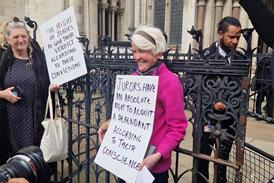
There have been two contrasting cases in the United States over the last few weeks, which highlight the current and future struggle over animal rights in the courts. By rights, I don’t mean animal welfare, but the ability of non-human animals to take advantage of fundamental or statutory rights through cases brought by them or on their behalf.
The first case is famous, and concerns a crested macaque from Sulawesi, Indonesia named Naruto, who took a selfie that subsequently went viral. The organisation, People for the Ethical Treatment of Animals (PETA), filed a lawsuit as Naruto’s next friend to ensure that the worldwide earnings of the photo went to Naruto himself as the owner of the image. In November last year, PETA and the British photographer who owned the camera reached a settlement whereby 25 percent of future revenue of the selfie would go to charitable organisations that protect Naruto and other crested macaques.
The camera owner always claimed that he owned the image because he had to work so hard to obtain it. He spent several days with the monkeys to allow them to become relaxed in his company. He set up his camera on a tripod with a cable release switch, which Naruto pressed. He also had to make sure that the light and contrast switches on the camera were properly set.
Everyone thought that the affair was then over. But last month, the Ninth Circuit Court of Appeals did not grant the parties’ joint motion to dismiss the case, but instead threw out the copyright lawsuit brought by the monkey, apparently annoyed by PETA having launched it in the first place. Whereas PETA was objecting to the monkey being exploited by the British photographer, the court objected to the monkey being exploited by PETA for the advancement of its own agenda. On either view, the monkey was being exploited.
However, the court, in rejecting PETA’s standing as next friend, confirmed the position that animals can in theory sue under the US Constitution. They are not barred from doing so. It ruled that Naruto was the author and owner of the photograph, and had suffered economic harm. But he was barred from bringing a copyright case because non-human animals are not explicitly mentioned as being able to do so by the relevant statute.
You will be pleased to know that a film is now in the offing. It will be interesting to discover whether Naruto will benefit from the box office takings. And presumably he or other crested macaques will star in it regardless of their will?
The second case is more serious, and raises issues of more direct assistance to animals. It was decided in the New York Court of Appeals and concerned a petition for habeas corpus on behalf of two adult chimpanzees, Tommy and Kiko, brought by the Nonhuman Rights Project on their behalf. Tommy and Kiko are confined by their owners to small cages in a warehouse and a cement storefront in a crowded residential area.
The circumstances are heart-breaking. The question was: ‘Can a non-human animal be entitled to release from confinement through the writ of habeas corpus? Should such a being be treated as a person or as property, in essence a thing?’
Since human infants, comatose human adults and a parent suffering from dementia can be the subject of habeas corpus, being a ‘moral agent’ who can freely choose to act as morality requires is not a necessary condition of being a ‘moral patient’ who can be wronged and may have the right to redress wrongs. The court particularly said that in elevating our own species, we should not lower the status of other highly intelligent species.
The court noted that ‘chimpanzees have advanced cognitive abilities, including being able to remember the past and plan for the future, the capacities of self-awareness and self-control, and the ability to communicate through sign language. Chimpanzees make tools to catch insects; they recognise themselves in mirrors, photographs, and television images; they imitate others; they exhibit compassion and depression when a community member dies; they even display a sense of humor.’ They also share at least 96% of their DNA with us.
The court’s conclusion? It denied the Nonhuman Rights Project leave to appeal against a judgement that went against them, but said: ‘The issue whether a nonhuman animal has a fundamental right to liberty protected by the writ of habeas corpus is profound and far-reaching. It speaks to our relationship with all the life around us. Ultimately, we will not be able to ignore it. While it may be arguable that a chimpanzee is not a ‘person’, there is no doubt that it is not merely a thing.’
This is an issue which will need to be dealt with by all of us soon.


















![David Lester (senior partner at Blythe Liggins), Darryl Barnes, Jagdeep Sandher (head of dispute resolution at Blythe Liggins)[4]](https://d1d8vslyhr7rdg.cloudfront.net/Pictures/274x183/4/2/8/116428_davidlesterseniorpartneratblytheligginsdarrylbarnesjagdeepsandherheadofdisputeresolutionatblytheliggins4_981603_crop.jpg)





No comments yet